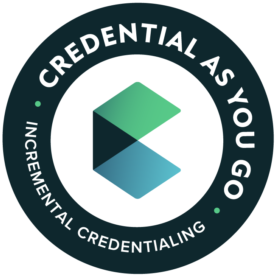Stakeholders in incremental credentialing should be reminded that individuals in the criminal justice system have historically not participated in equitable education systems at the K-12 and postsecondary levels. In many cases, these inequities in academic achievement and educational opportunity have undermined their quality of life since childhood. A 2016 report showed that 30 percent of individuals incarcerated in state and federal prisons lack a high school diploma or its equivalent. Additionally, one-third of the nation’s incarcerated adults performed at low levels of literacy, and about half of them had low levels of numeracy skills compared with the general population. Although 42 percent of incarcerated adults report having some form of education, only 21 percent were currently studying for a formal degree or credential. It is estimated that 2.3 million incarcerated individuals lack access to higher education of any kind, and their ability to obtain access to quality pathways is severely restricted. Reports further reinforce the need to increase incarcerated and re-entering individuals’ access to high-quality learning experiences and high-quality credentials for. Going further, incarcerated learners need full academic programs that lead to meaningful credentials and employment opportunities upon release.
To ensure that incremental credentialing is equitable, we must address the known inequities. The next section of this playbook will explore promising practices undertaken by states, institutions, and other stakeholders to address equity outcomes in incremental credentialing. By adopting these practices and continuing to collect data on their impact, we can better understand their effectiveness and make informed decisions to improve equity outcomes in incremental credentialing.
This section highlights a range of practices and programs that may close equity gaps in incremental credentialing. These include targeted outreach and recruitment efforts, innovative program design and delivery models, and the use of data and analytics to inform decision-making. The section also includes several sets of questions to consider when creating initiatives and programs. These questions are designed to help stakeholders identify and address any potential barriers, and to ensure that equity is at the forefront of their efforts.
Related Work/Initiatives:

Credential As You Go has acquired three phases of funding to date. Lumina Foundation funded Phase I, resulting in the Incremental Credential Framework for testing. The Institute of Education Sciences, U.S. Department of Education funds Phase II (Grant R305T210063), which focuses on rapid prototyping of and research on incremental credentials with a national campaign. An anonymous private donor fund at the Program on Skills, Credentials & Workforce Policy at George Washington University funds the development of the prototype Learn and Work Ecosystem Library. Walmart funds Phase III, which focuses on systems change for expansion and sustainability of incremental credentials. The opinions expressed are those of the authors and do not represent views of Lumina Foundation, Institute of Education Sciences, the U.S. Department of Education, Walmart, or George Washington University.